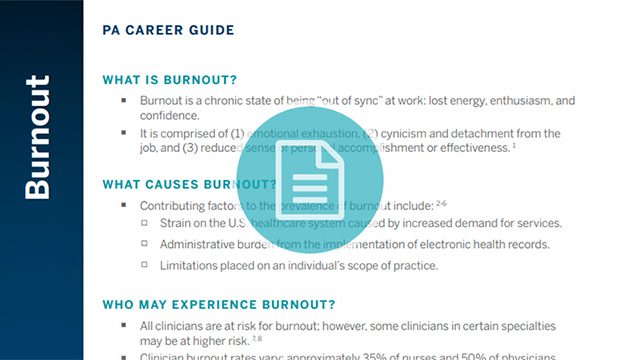PA Administrators
PAs in administration utilize leadership and management competencies above and beyond their clinical skill set to positively affect patient care; they are aspiring or current experts in the business of medicine, revenue cycle management, quality improvement, health information technology, and compliance. AAPA supports PA administrators by offering opportunities to acquire skills and knowledge.
Competencies for PAs in Healthcare Administration
PA administrators should demonstrate competence in all areas of administration, including six domains of competencies: leadership, communication and interprofessional relationships, PA professional practice and advocacy, healthcare environment, business skills and principles, and education and academic development.
The 2023 set of PA administrator competencies serves as guidance for individual PAs, health systems, educators, and others who promote the development of administrative skills.
Explore the competencies, competency domains, and resources to develop administrative skills.
Resources by Competency Domain
Guide to Reading and Understanding Financial Statements
A beginner’s guide to reading and understanding financial statements.

Blueprint for Addressing Physician Assistant Well-being and Burnout
The goal of the Blueprint for Addressing PA Well-Being and Burnout is to provide a brief overview of what is currently known about PA burnout and well-being, and more importantly, provide an enduring framework for increasing PA engagement at work and improving the well-being of the profession.
Administrative Factors in Onboarding Programs
This article describes administrative factors that should be considered when designing an onboarding program for PAs and NPs.
Mentor Match Volunteers
Facilitate the professional growth in others while developing your communication skills as a mentor.
Creating a Culture of Continuous Improvement
An article about continuous improvement to improve quality and outcomes.
Becoming the Self-Aware Self-Advocate
Contracts, negotiations, promotions or job changes, your professional life isn’t just about patient care. In this course, we will guide you through how to find your voice in salary and position negotiations, navigate the waters… more
The Importance of Communication in Your PA Career
Here, I’d like to suggest some ways of improving communication at work, with the goal of greater vitality, presence, and connection to colleagues and patients.
Leadership and Advocacy Summit
Join your PA and PA student colleagues in the nation’s capital to learn about key developments facing the profession, association management, leadership best practices, and advocacy skill-building. You’ll even have the opportunity to meet with Congressional legislators.
Tools for State Advocates
Strengthen your state and local advocacy with resources on Optimal Team Practice, state laws and regulations, and grassroots advocacy.
The Importance of Continuous Education in Healthcare
An article about the importance and value of continuing education in healthcare.
Tips for Precepting
Tips and resources from PAEA for making precepting painless.
Microskills for Preceptors
Five microskills for guiding the preceptor-student encounter.
SNAPPS: A Six-Step Learner-Centered Approach to Clinical Education
A six-step method for preceptors to promote critical thinking and empower learners to take an active role in their education.
Current Volunteer Opportunities
We want your voice to be heard. That’s why we offer a variety of volunteer leadership opportunities – exclusive to AAPA members – that can make an immediate impact on your career.
Constituent Organizations
Constituent organizations are independent organizations affiliated with AAPA. They provide their members with locally based CME, networking opportunities, social gatherings, timely information, advocacy and job resources.
Research
The AAPA Research Team leads one of AAPA’s most important responsibilities: supporting research and collecting and analyzing data to track growth and change in the PA profession.